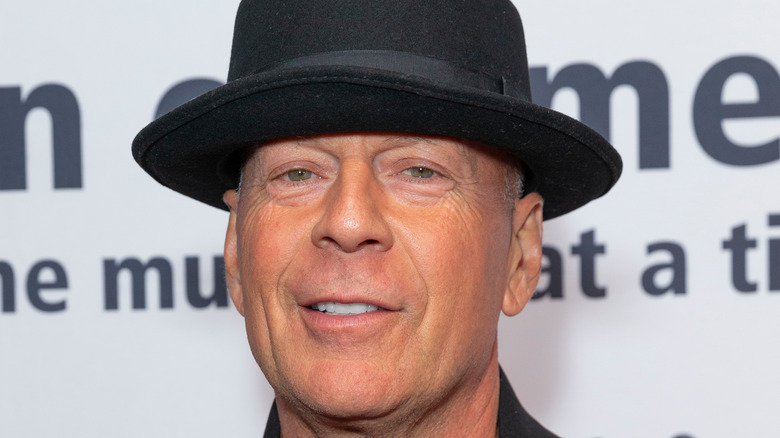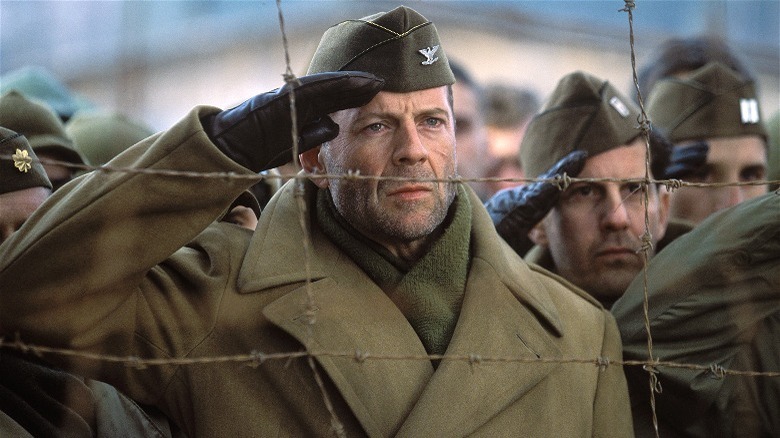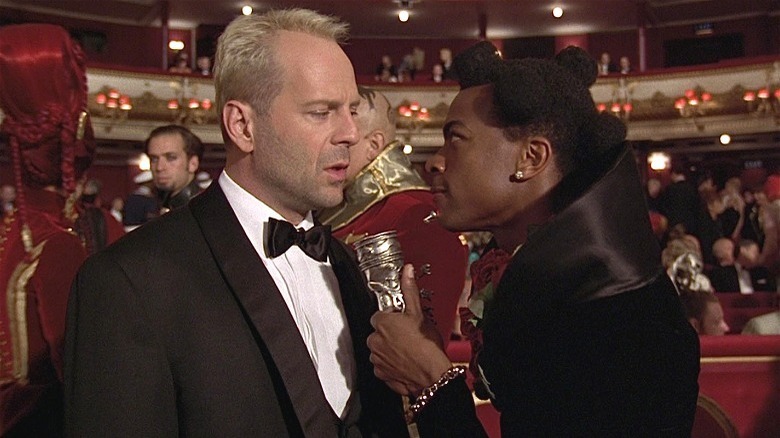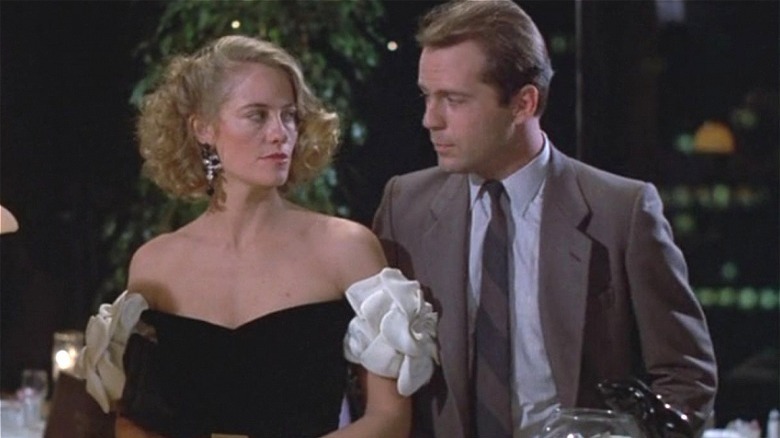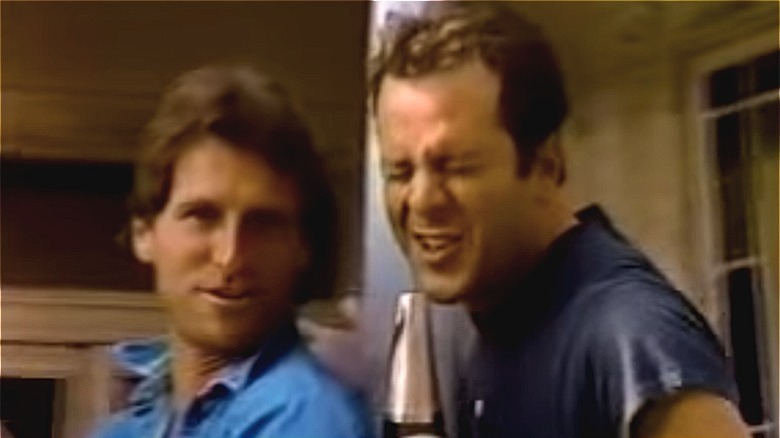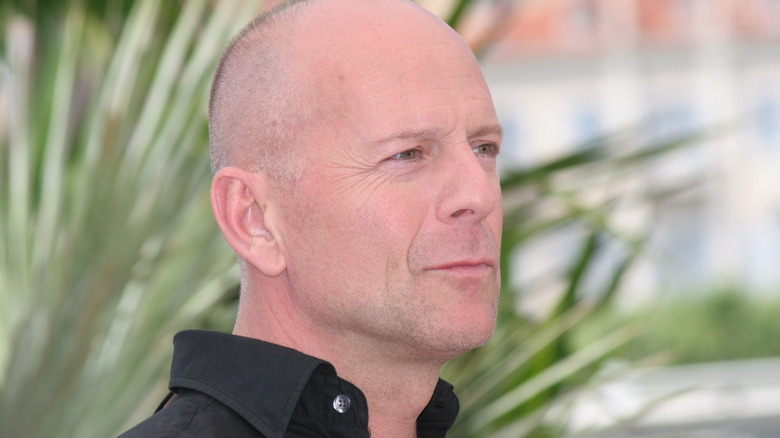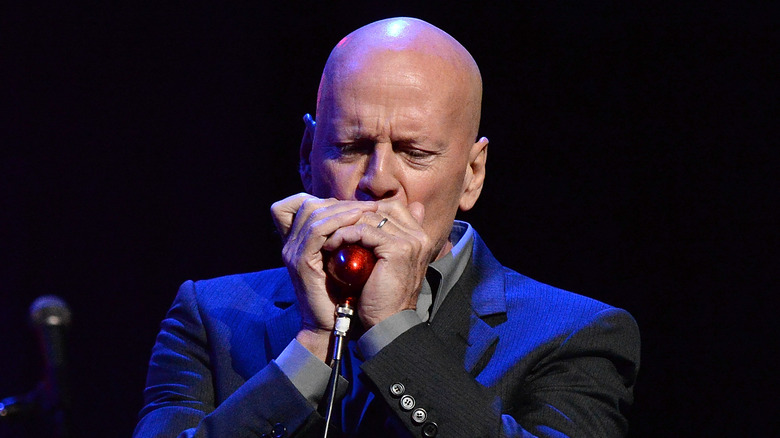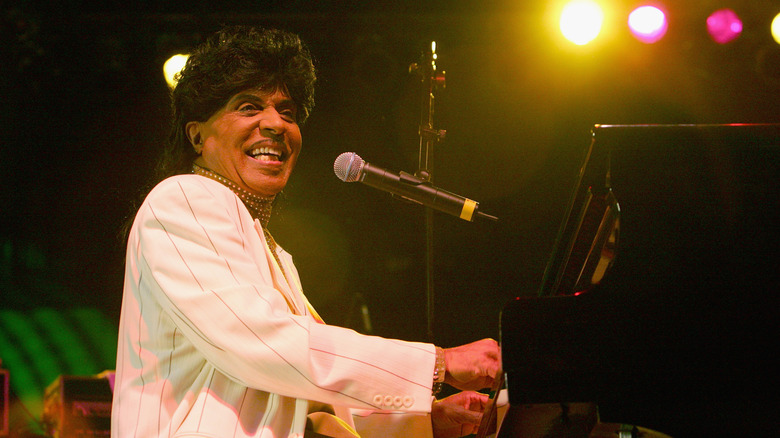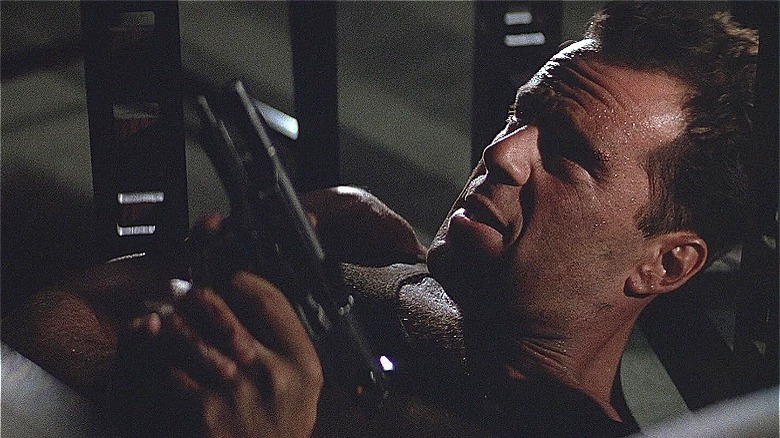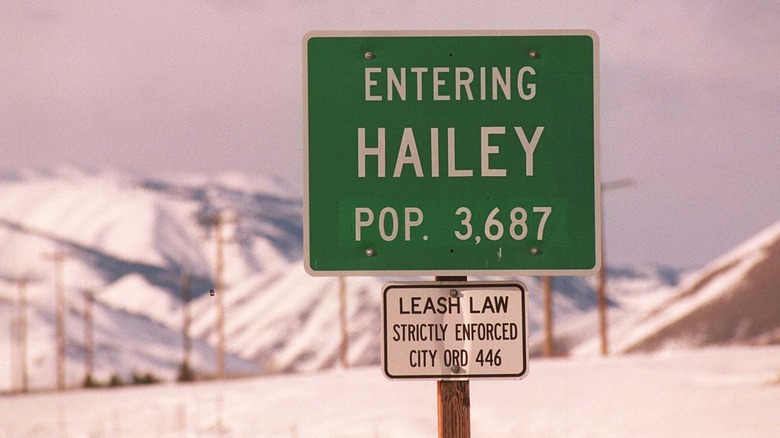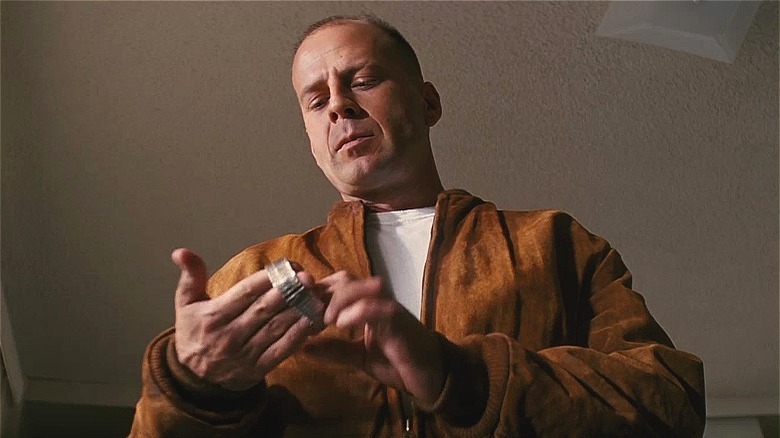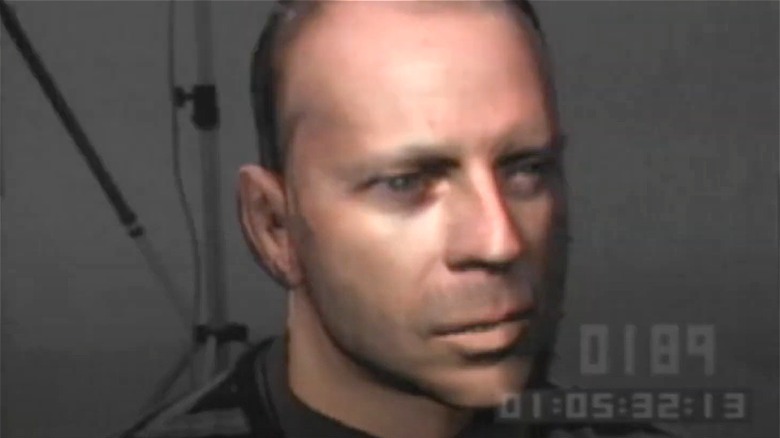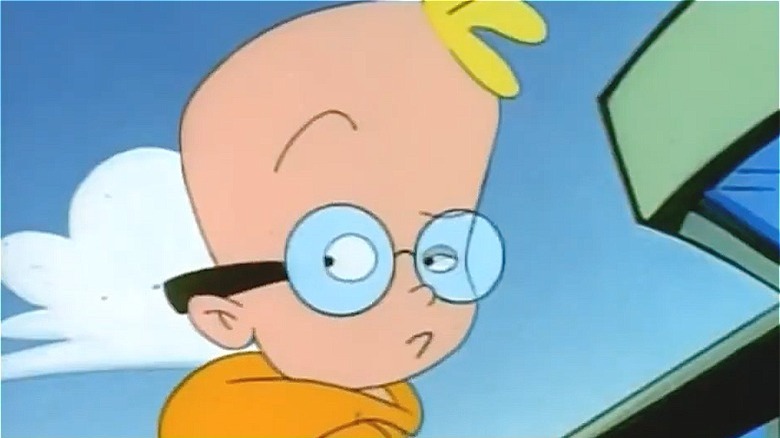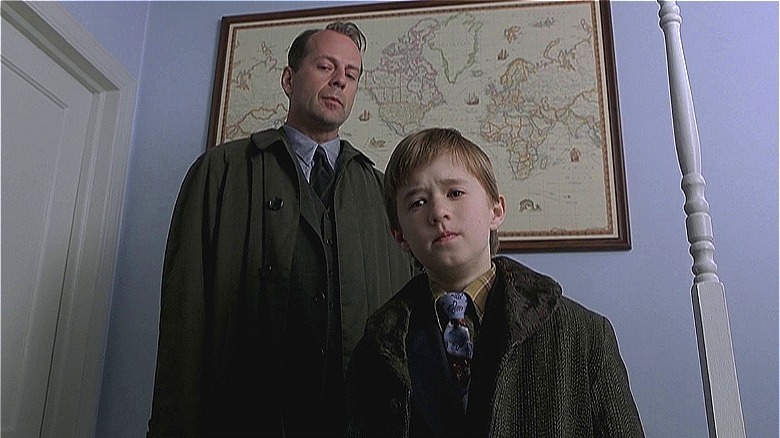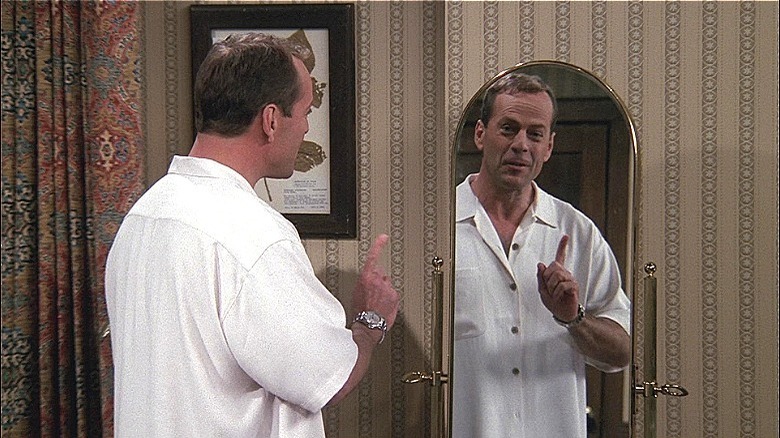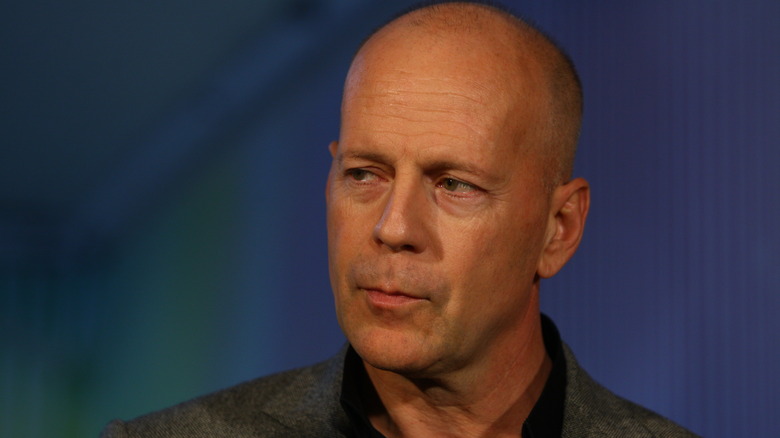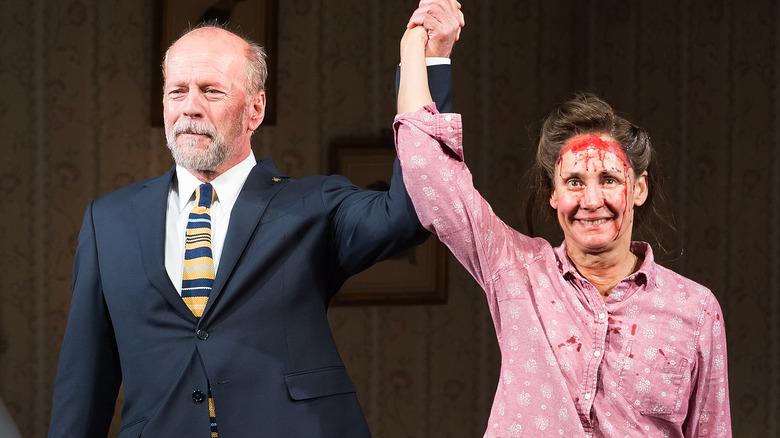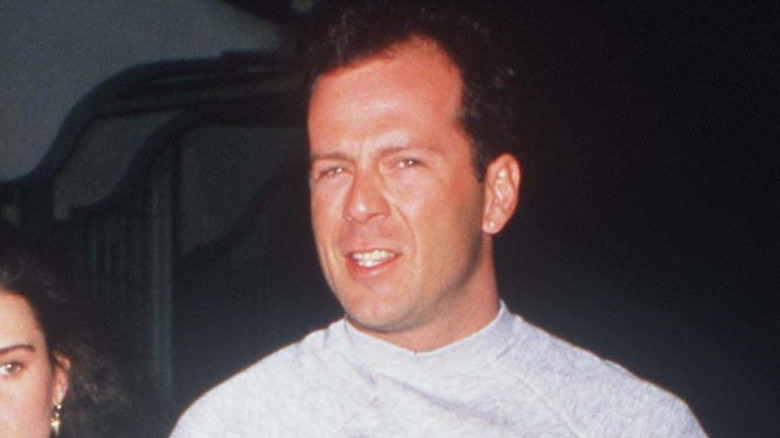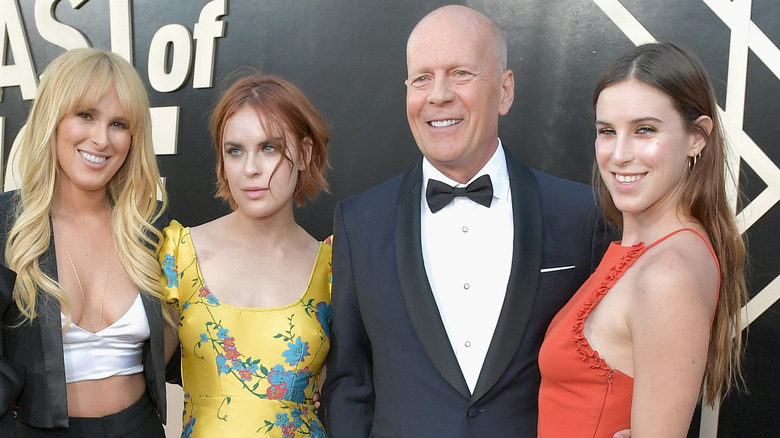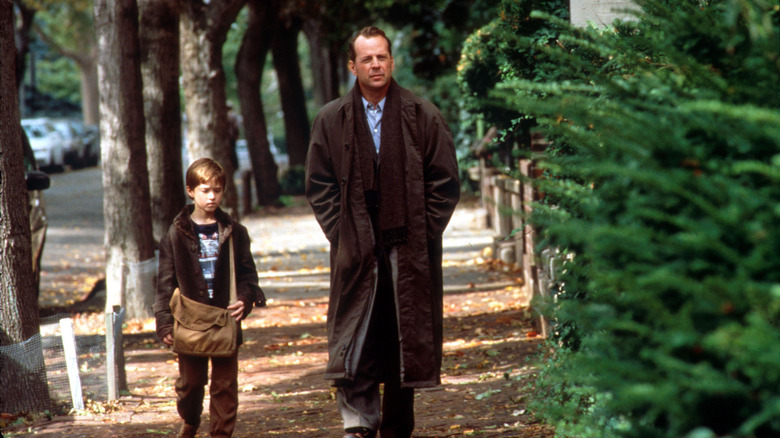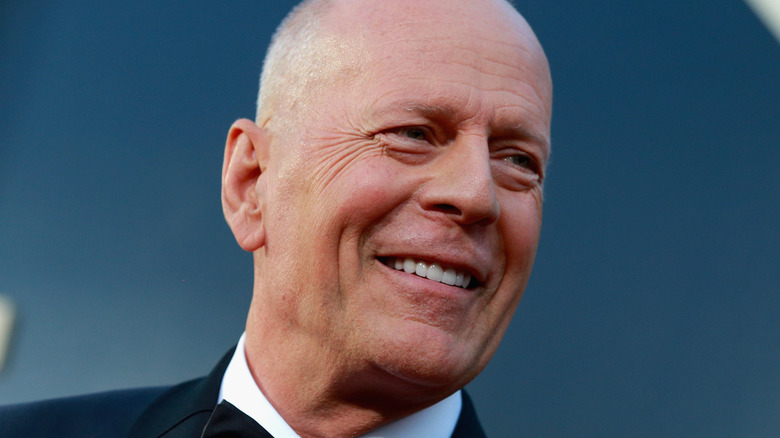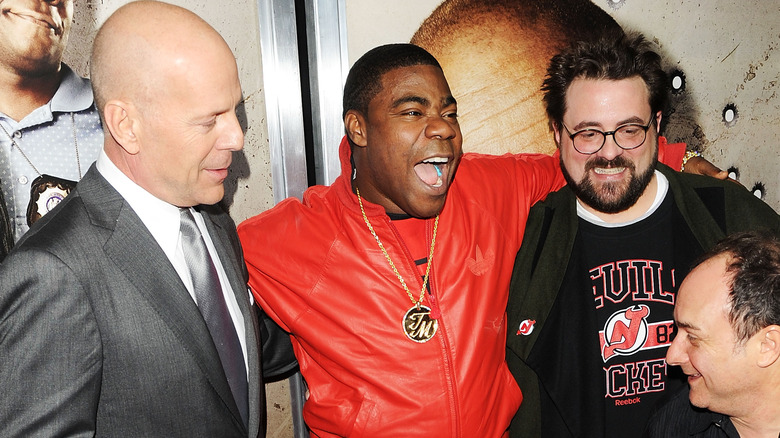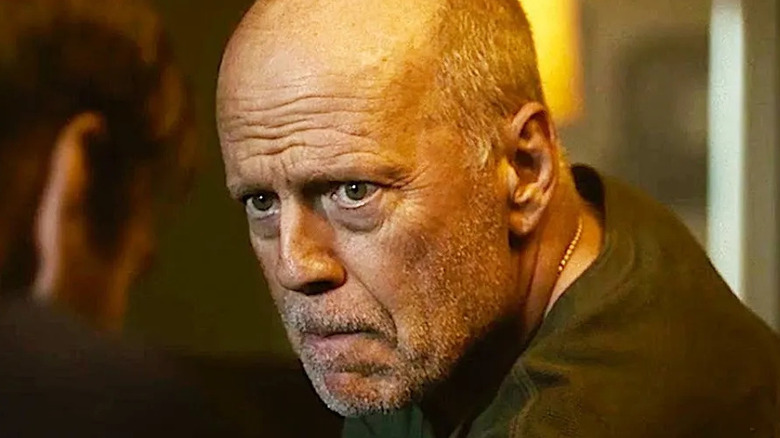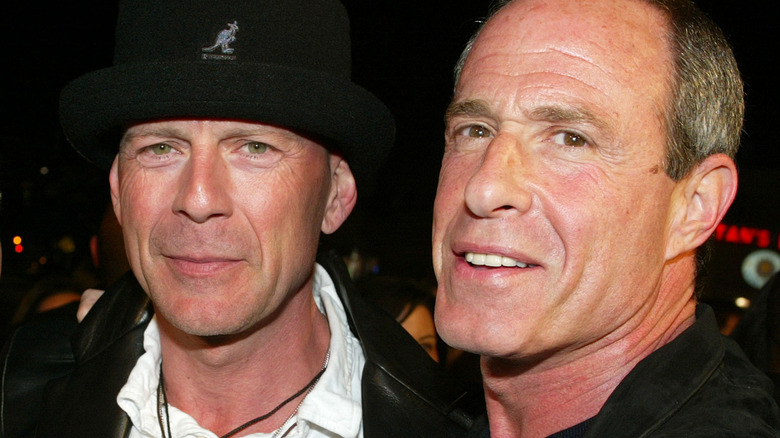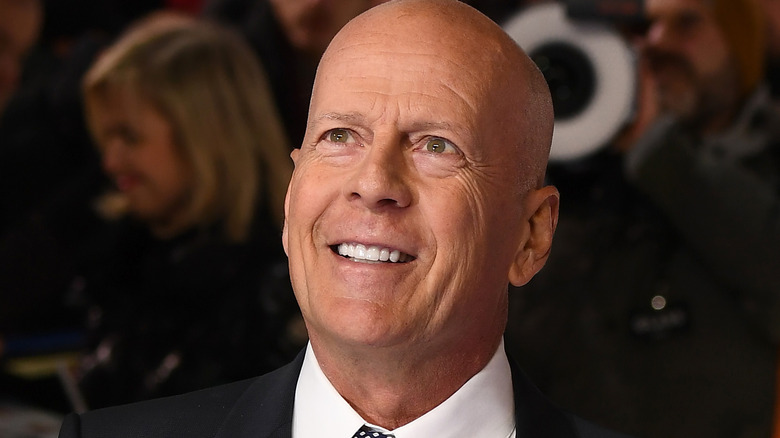Bruce Willis: What Only True Fans Know About Hollywood's Action Hero
An actor, singer, and entrepreneur, Bruce Willis has worn many hats throughout his decades-long career in film, television, music and as a commercial pitchman.
His breakout performance in the 1980s TV dramedy "Moonlighting" put him on the map, but it was his portrayal of John McClane in the "Die Hard" film franchise that launched him into superstardom. As prominent, versatile roles in everything from "Pulp Fiction" to "The Sixth Sense" to "Death Becomes Her," "The Fifth Element" and "Friends" followed, Willis became an icon of the big screen, as well as the source of tabloid fodder. His relationship with Demi Moore and occasionally-voiced political views put him in the spotlight nearly as much as his top-billed blockbusters, yet that never stopped the freight train that was his career.
Bruce Willis fans likely already know some fun facts about the man himself — like his alter ego "Bruno," or his feud with indie filmmaker Kevin Smith. But they might be surprised by how much there's left to discover; below, some obscure facts for even the most discerning Willis admirer.
Born in Germany, raised in New Jersey
Through Bruce Willis considers himself a proud New Jersey native, he was actually born in West Germany. His father, David Willis, was a military man who was stationed in the city Idar-Oberstein at the time of Bruce's birth in 1955. Bruce's mother, Marlene, was from Kaufungen, Germany. Two years later, David Willis was discharged and relocated with his family to Carney's Point, New Jersey (via Biography.com).
As a hard-working family man, David took on various jobs, including as a welder and a factory worker. It was perhaps his respect for his father's hard work ethic, and military background, that made Bruce an advocate for the U.S. Armed Forces. He once phoned President George H. W. Bush and asked to enlist, but was told he was too old (via The Daily Mail). However, it seemed that he found other ways to serve his country: In 2003, Willis performed for U.S. troops in Tal Afar, Iraq, to show his support during the Iraq War (via The Guardian).
Willis had a stutter until he discovered acting
Some Willis movies have him playing men of few words. However, there was a time in the movie star's life when he struggled with speaking altogether. In a 2002 interview with Reader's Digest, Willis spoke candidly about a debilitating stutter that he suffered as a child.
Willis told the magazine that he had a stutter from age 9 to 17. Though his speaking issues were a source of insecurity for Willis, he managed to make it work. "I had friends, I was elected student council president," he said. "So I was popular in that sense, but inside I was really shook up by the fact that I couldn't get rid of this stutter."
While attending Penns Grove High School in New Jersey, Willis discovered the school's theater department. That's when an amazing thing happened. "When I got on stage, I stopped stuttering," Willis said. "When I stepped off the stage, I started stuttering again. And I went, 'This is a miracle. I got to investigate this more.'" His newly discovered love of acting would lead Willis to study more of the craft when he attended Montclair State College after graduating high school.
Willis had several jobs before he became an actor
Fame doesn't usually happen overnight, and Bruce Willis's story is no different. After high school, Willis found work at a chemical factory, and later as a security guard at a nuclear power plant. He then dropped out of Montclair State College during his sophomore year and moved to New York City, where he worked for years as a bartender (via Washington Post).
Rumor has it that Willis had a job as a private investigator before he began acting professionally. As though by fate, he would go on to play a character with the same profession when he was cast as private eye David Addison, Jr. in the hit ABC series, "Moonlighting." The show follows Addison and former model Maddie Hayes (Cybill Shepherd), two partners from a detective agency who solve mysteries while engaging in clever banter amidst "will-they-won't-they" sexual tension. "Moonlighting" was a huge hit with TV critics and audiences, and was nominated for numerous awards during its four-season run, including Golden Globes, People's Choice Awards, and the Primetime Emmys — winning six of the latter.
Bruce quit drinking alcohol
Willis might play a lot of tough guys on screen, but in real life, he's just as human as anyone else. Following his rise to fame in the late 1980s, Willis was hired by Seagrams to endorse its wine coolers, appearing in commercials for the company. However, Willis later pulled out of his deal with Seagrams when he realized that he had a problem. In 1988, Willis reportedly joined Alcoholics Anonymous in an attempt to get his drinking under control.
In an interview with GQ in 2013, Willis spoke candidly about his drinking habit. "I had been sober [for a while]. But once I realized that I wasn't gonna run myself off the pier of life with alcohol, drinking vodka out of the bottle every day ... I have wine now, mostly when I eat." A 2004 article from the National Enquirer stated that Willis went "off the wagon" at one point while at a hotel in Paris, but a representative for Willis quickly denied these claims.
If you or anyone you know is struggling with addiction issues, help is available. Visit the Substance Abuse and Mental Health Services Administration website or contact SAMHSA's National Helpline at 1-800-662-HELP (4357).
Willis was once arrested on suspicion of assaulting a cop
Newfound fame can sometimes lead one to believe they are untouchable –- however, one can also soon be met with a rude awakening. One year before Willis quit drinking, his antics created a stir that landed him in trouble with the law. A 1987 article from the United Press International described a wild party gone wrong at Willis's residence in Los Angeles. A neighbor called the police about the noise coming from Willis's home, and when they went to investigate, they found a party in full swing, complete with loud music and alcohol.
A detective reported that Willis, who appeared to be intoxicated, shouted at the officers to leave his home. When they refused, Willis allegedly attempted to strike one of the officers. He was restrained and handcuffed by police, injuring himself in the process thanks to a broken clavicle that he had suffered previously while skiing. He was first taken to the hospital to treat the injury before being processed, and then was later released. Charges against him were dropped after he agreed to apologize to his neighbors and the police.
Yes, we are going to talk about Bruno
Though some Bruce Willis fans may know about his nickname, "Bruno," there may be those who have found themselves wondering where the name came from. Gen X'ers may remember, but for those millennials and Gen Z'ers not in the know, here's the scoop.
Once Willis found fame for his starring role in "Moonlighting," he decided to try his hand at other performing arts — namely, music. The result was an album released in 1987, "The Return of Bruno," in which Willis sang and played harmonica alongside some pretty impressive recording artists (via Diffuser). The name "Bruno" came from an alter ego invented by Willis, called Bruno Radolini. The album was followed by an HBO special mockumentary about the character.
"The Return of Bruno" was released on the legendary Motown Records and was heavy with blues and R&B influences. If the existence of the album wasn't surprising enough, even more unexpected was that it had decent success. The single "Respect Yourself," featuring vocals from the Pointer Sisters, made it to the Top Five of the Billboard chart, and the album itself topped out at number 14 on the Top 200.
Little Richard officiated Bruce and Demi's wedding
Bruce Willis's former marriage to Demi Moore may be old news in 2022, but for 13 years the power couple was the talk of the town and the subject of plenty of tabloid drama. Moore and Willis met at the premiere of "Stakeout" in 1987 when she was engaged to actor Emilio Estevez. Months later, Moore and Estevez called off their betrothal, and Willis swooped in shortly after.
Not far into their relationship, Willis and Moore took an impromptu vacation to Las Vegas, where Willis popped the question. They were married at a small chapel in the Golden Nugget hotel, and the ceremony was officiated by none other than rock 'n' roll legend Little Richard. Little Richard had overseen a number of other celebrity weddings as well, including Cyndi Lauper and David Thornton, Stevie Van Zandt and Maureen Santoro, and Tom Petty and Dana York (as reported by Far Out).
Though Willis and Moore divorced in 2000, the two continued to have a strong friendship. With the news of Little Richard's death in 2020, Moore posted a wedding photograph of herself and Willis with Little Richard on Instagram, saying, "Bruce and I were so lucky and honored to have him officiate our wedding back in 1987 — thankful for the memories."
Die Hard gave Willis permanent hearing damage
From crawling through vents to jumping off buildings, Bruce Willis's role as John McClane in "Die Hard" had a lot of physical demands. After all, you don't earn a reputation as a rugged action movie star without putting in the work. Willis has previously declared that he did many of his own stunts for the action-packed franchise, but not without consequence.
One of the movie's most memorable one-liners comes from a scene when McClane dives under a set of tables to dodge the oncoming bullets of a Gruber henchman. The bad guy taunts McClane for failing to shoot him when he had the chance, telling him, "Next time you have the chance to kill someone, don't hesitate." McClane then shoots upward through the table, and the baddie drops dead. "Thanks for the advice," he quips.
In 2007, Willis did an interview with the Guardian in which he talked about the long term effects of filming the scene. Apparently, the director required very loud blanks to achieve the sound he wanted — yet as a result, Willis endured severe hearing loss. "I suffer two-thirds partial hearing loss in my left ear and have a tendency to say, 'Whaaa?'" he told the Guardian.
Willis spruced up the town of Hailey, Idaho
It isn't unusual for a superstar to grow weary of the spotlight, especially with eyes on his or her every move. Shortly after Bruce Willis married Demi Moore in 1987, the couple decided to withdraw from the Hollywood ruckus and found solitude in the small town of Hailey, Idaho.
A far cry from the hustle and bustle of Los Angeles, Hailey's population consisted of just 3,700 in the year 1990. The rural community has grown steadily since, with a current population of more than 9,000. With snow-capped mountains and frigid temperatures, Hailey was a drastic shift from the warm climate and palm tree-lined streets of L.A. The town seemed to suit Willis's needs, however, who put much of his own time and money into improving its infrastructure. He opened up a diner and refurbished a rundown bar, as well as built a theater for Hailey citizens to enjoy classic live entertainment.
In the interview with Reader's Digest, Willis spoke about how Hailey was advantageous when it came to raising his children: "This is a really great community for kids. There are great schools here. It's a little isolated, but it's always been a sanctuary for us, and I think it's a sanctuary for our kids." When Moore and Willis split in 2000, the Willis family decided to leave Hailey behind. However, Shorty's Diner and the Mint, both businesses previously owned by Willis, are still booming.
He got the part in Pulp Fiction thanks to Harvey Keitel
One of the biggest perks of fame is who you know, and Bruce Willis knows a lot of people in the biz. In 1994, Willis played boxer Butch Coolidge in "Pulp Fiction," which would go on to become one of the most influential movies of director Quentin Tarantino's career. Willis wasn't the first actor Tarantino had in mind, however, and it was thanks to fellow cast member Harvey Keitel that he was even hired at all.
According to an interview with the Washington Post in 2005, Willis and Keitel were neighbors while Willis was living in Los Angeles. The two struck up a conversation in which Willis mentioned that he was a big fan of "Reservoir Dogs." Keitel revealed to Willis that he was about to do another picture with Tarantino and a day later, Keitel invited Willis to a barbecue at his home. It just so happened that the "Pulp Fiction" director was also in attendance.
Willis told Tarantino that he'd "be happy to do anything" in his upcoming film, and Tarantino took his words to heart. Originally, the part of Butch had been offered to actor Matt Dillon, but it seemed that Dillon was not quite sold on the idea. While Willis was hoping to be cast as Vincent Vega, Tarantino offered him Butch's role instead, which he gladly accepted.
Bruce has his own video game
These days, the idea of A-list actors starring in video games isn't all that uncommon. "The Walking Dead" star Norman Reedus was the main protagonist in the highly praised "Death Stranding," while the incomparable Keanu Reeves played a big part as Johnny Silverhand in CD Projekt Red's "Cyberpunk 2077." Yet in the late 1990s, it was a little more unusual — which is why when Neversoft and Activision got Bruce Willis to star in their action shooter, "Apocalypse," it was a revolutionary idea.
Released for the first generation PlayStation in 1998, "Apocalypse" followed fresh on the heels of Willis's similarly named blockbuster hit, "Armageddon." Willis was just re-establishing himself as a big action movie star, so the idea of playing as the man himself was certainly an appealing notion for gamers. Willis starred as Trey Kincaid, a man fighting to stop the impending end of the world and the legendary Four Horsemen.
The studio utilized motion capture and photo-mapping to copy Willis's likeness for the main character, and he also provided the voice. Though the studio did hit a few snags along the way, "Apocalypse" was fairly well-received by game critics — even if almost no one remembers it now.
Willis had his own cartoon show
By the time the 1990s rolled around, Bruce Willis had it made. He was a big movie star, had released a hit album, and was married to one of the most beautiful women in Hollywood. So why not add a Saturday morning cartoon character to the list? It had worked for Howie Mandel, after all.
Enter "Bruno the Kid," an animated children's show created by Willis and co-produced by his brother, David. The series aired in syndication from 1996 to 1997 and starred Willis as the voice of Bruno, an 11-year-old who works for a spy network. On top of being a computer genius, Bruno spends his time taking down the world's biggest villains in between 6th grade classes and trips to the arcade. Willis even co-wrote and sang the show's theme song. The series also featured many well-known voice actors of the day, including Tim Curry, Mark Hamill, Jennifer Hale, and Frank Welker.
The Sixth Sense was Willis's apology to Disney
Besides his role as John McClane in the enduring "Die Hard" franchise, Willis's second most popular film appearance could arguably be in M. Night Shyamalan's "The Sixth Sense." Hitting theaters in 1999, the hauntingly suspenseful film about a boy who can see ghosts gave Willis the chance to broaden his acting chops and venture outside of the shoot-em-up action genre. But he might not have ever played the part of psychologist Malcolm Crowe if he hadn't owed the Disney studio, like, big time.
The story goes that in 1997, Willis was doing a project for Disney called "Broadway Brawler," a romantic comedy that had him playing a retired pro hockey player who falls in love with a woman played by Maura Tierney. Unfortunately, Willis had issues with members of the crew, particularly the director, producer, and cinematographer. His beef with these key players on the project led to each of them getting fired, and eventually, the entire film was scrapped.
To avoid a legal battle with the studio, Willis agreed to sign on to three films for Disney. One of them was "The Sixth Sense," while the other two were "Armageddon" and "The Kid." Even though Willis took a significant pay cut for his work, at least two of these films helped to cement his continued reputation as one of Hollywood's biggest stars — we bet you can guess which ones.
He appeared on Friends after losing a bet with Matthew Perry
Over its 10-season run, America's most popular sitcom, "Friends," had a slew of memorable guest stars. At the top of that list is good ol' Willis himself, who played Paul Stevens in a three-episode arc in the show's sixth season. Willis was the father of Ross's (David Schwimmer) college-age girlfriend, Elizabeth (Alexandra Holden), and wasn't too thrilled with his little girl dating an older man. He was also Rachel's (Jennifer Aniston) love interest until she encouraged him to open up more, causing a floodgate of repressed emotions.
How did "Friends" get such a big star to appear in not just one, but three episodes? Well, it's all thanks to Matthew Perry, who played Chandler on the show. Perry and Willis co-starred in the 2000 crime comedy "The Whole Nine Yards," during which the two became fast friends. As the story goes, Perry bet Willis that the film would be a box office hit, and to their surprise, the movie raked in a worldwide total of $106 million. As a result of losing the bet, Willis had to guest star on "Friends" without pay.
Willis held up his end of the bargain, and though he did receive a paycheck, he ended up donating all of it to charity.
Bruce's brother, Robert, died in 2001
Bruce is the oldest of four children, including a sister, Florence, and brothers Robert and David. In 2001, the family was struck by tragedy with the death of Robert Willis, who died of pancreatic cancer. As reported by Variety, Robert was 42 years old, and a web designer. Bruce issued a statement that said, "We very much loved our brother. He was not only a good brother but a wonderful son to our parents. We will sorely miss him."
According to an article from the Irish Examiner in 2002, Willis claimed that he made contact with Robert through a medium. "This woman is someone who can receive information from the other side," he said. "She began speaking in the voice of my brother, cursing like he did. Tears rolled down my face and now I know the switch is not turned off, that there is life after death. I don't know how it works but I believe it."
Willis made his Broadway debut in Misery
While Bruce Willis had enjoyed a successful film career, he didn't lose his love for the theater. In 2015, he found his way onto the Broadway stage, playing Paul Sheldon in a stage adaptation of Stephen King's thriller, "Misery." Playing opposite Willis as the obsessed fan, Annie Wilkes, was Laurie Metcalf of "Roseanne" fame. The story has Sheldon, a famous author, at the mercy of his "number one fan," Annie, who takes him into her home after he breaks both of his legs in a bad car wreck. The immobilized author is then held hostage and tortured by Annie for a number of days, as she forces him to write a new novel starring his best-selling fictional creation, Misery Chastain.
In spite of the source material and the reputation of the leading actors, "Misery" on Broadway was bashed by the critics. Entertainment Weekly called Willis's performance flat and "inert," while the New York Times found the suspense sorely lacking. "You're more likely to experience chills sitting in a tepid bath at home," wrote the Times' Ben Brantley.
Bruce Willis nearly starred in Growing Pains
Bruce Willis landed a few unnamed, minor, uncredited roles in some early 1980s movies, as well as minor roles on "Miami Vice" and a reboot of "The Twilight Zone." In 1985, he'd debut in an iconic, influential TV role that would propel him to household-name-status: Wisecracking, musically-inclined detective David Addison on ABC's "Moonlighting." But he nearly instead secured the lead role on a different ABC series that launched in 1985 — the family sitcom "Growing Pains," in the role Alan Thicke eventually played for 167 episodes over 7 years.
"At the time, ABC was interested in a couple of actors and finding the right vehicle for them," Thicke told "Good Morning America" in 2011. "'Growing Pains' was one of the vehicles — I was one of the guys. And the other guy was Bruce Willis. So, I guess there would have been a chance that I would have been in 'Moonlighting' and Bruce Willis would have been their dad."
While "Growing Pains" may have ended up being the steadier gig (the series aired over 100 more episodes than the 66 that "Moonlighting" broadcast), it won Willis an Emmy and would be hugely influential on "adult comedy" shows and will-they-won't-they TV romances for decades to come.
Willis has five daughters
Behind all the action movie bravado, Willis is a family man. Through two high-profile celebrity marriages, he's become a dad five times over, the father of only daughters.
Willis met Demi Moore in 1987 at the premiere of the Emilio Estevez/Richard Dreyfuss 1987 movie "Stakeout" (Estevez and Moore had been engaged); four months later, they were married in Las Vegas. In 1988, Moore gave birth to Rumer (future star of movies like "The House Bunny"); three years later, Willis and Moore welcomed Scout (who made her debut the same year as the only film her parents would make together, "Mortal Thoughts," and would go on to become a musician like her dad), and in 1994 came Tallulah Belle (a name suggested by Meg Ryan, which Willis initially opposed). One of the biggest star couples in the world at the time, Bruce and Demi filed for divorce in 1998.
A decade and change later, Willis rebounded with another wedding, this time marrying model Emma Hemming in 2009. Three years after that, Willis became a dad all over again when Hemming delivered daughter Mabel Ray in April 2012. Two years later, the couple had another daughter, Evelyn Penn.
Bruce Willis learned to write with his right hand for The Sixth Sense
The 1999 supernatural drama "The Sixth Sense" helped return Willis once again to the top of the Hollywood ranks, earning $672 million and later a nomination for best picture at the Academy Awards.
In the film, Willis portrayed a forlorn child psychologist attempting to aid a frightened child who says he can see and communicate with ghosts. "The Sixth Sense" offered one of the most famous and compelling twists in cinematic history (spoiler alert): The psychologist was dead the entire time — he was one of the ghosts that the boy could see and hear. The main reason why the Willis character was so upset was because he missed his wife. Viewers had been led to believe that his marriage ended in divorce, not death.
To keep all these twists and secrets concealed until their big reveals, Willis worked with director M. Night Shyamalan to ensure that his left hand was never seen up close on camera. Men traditionally wear a wedding ring on the left hand, and Malcolm would need to be missing his because he was dead. The issue was that Willis is left-handed in real life, and the character needed to be seen writing things down. The solution: Willis learned to write with his right hand.
Bruce Willis once bought 12,000 boxes of cookies
Willis and former spouse Demi Moore raised their three children in central Idaho. Youngest daughter Tallulah Belle was active in Girl Scouts in the early 2000s, as were her cousins, Katie and Hayley Rogers. So, when the time arrived for their annual fundraising drive, Sun Valley, Idaho-based Troop No. 231 received a lucrative order of Girl Scouts cookies.
As explained in a 2002 report from the Deseret News, Girl Scout cookie season coincided with the early days of Operation Enduring Freedom, President George W. Bush's deployment of military operations to Afghanistan in search of terrorist leader Osama bin Laden (in response to the attacks of 9/11). Thousands of American military personnel were sent overseas for long stretches, and the Willis family wanted to provide a little American-made comfort to dispatched troops. Bruce Willis alone purchased 12,000 boxes of Girl Scout cookies, which were subsequently sent to Afghanistan. "His daughter came up with the idea, along with her two cousins," said Willis publicist Paul Bloch. "And the cookies were sent out."
He feuded with Kevin Smith
In 2010, Willis headlined the police action comedy "Cop Out," portraying one half of a cop duo (alongside Tracy Morgan) who have to track down a stolen priceless baseball card on the mean streets of New York City. Kevin Smith directed the film, a departure from his usual process of only helming his own material, generally low-key indie comedies like "Clerks" or "Mallrats."
Smith and Willis had major issues with one another making "Cop Out," and Smith — who has made a substantial second act out of podcasting, spoken word appearances and other talk-heavy side efforts — has told the stories many times.
"One guy wouldn't even sit for a f***in' poster shoot," Smith said of his actor on "WTF with Marc Maron" (via The AV Club). "Were it not for Tracy, I might've killed myself or someone else in the making of that movie." On "The Opie and Anthony Show" (via Uproxx), Smith called an unnamed actor on "Cop Out" (but presumed to be Willis) a "passionless piece of s***" and accused him of "actively working against the production." At the wrap party (according to the National Enquirer, via SlashFilm), Smith thanked, "Everyone who worked on the film, except for Bruce Willis, who is a f*****g d***!"
Willis has remained largely quiet on the matter, but a representative of the actor gave The Hollywood Reporter a summary of his issues. "He smokes way too much pot," the rep said of Smith. "He sat behind his monitor. He didn't interact with the actors." Following the actor's retirement due to an aphasia diagnosis, Smith publicly apologized.
He became king of straight-to-video action films
Between 2014 and early 2023, the name Bruce Willis appeared above the title of 33 gritty action movies, most of them centered on law enforcement, dispatching bad guys, or exacting revenge — and virtually none of them creating any sort of lasting impression on the pop culture landscape. Among the titles you most likely didn't see: "Vendetta," "Deadlock," "Out of Death," "Hard Kill," "First Kill," "Acts of Violence," "Survive the Night," and three "Detective Knight" entries.) None of the projects received a theatrical release in the United States; producers distributed instead directly on DVD and streaming.
Although folks like Charles Bronson certainly starred in plenty of late career, straight-to-video clunkers, Willis became a modern-day, digital pioneer in what some dubbed the "geezer teaser" — formulaic, economically efficient action flicks that air on TV in South America and Europe but are sent to on-demand services in the U.S.
Such films were throwbacks to box office fare of the '80s and '90s, sometimes featuring stars of the era in a limited capacity, but enough that producers can put a certain face and name on the poster. Before his diagnosis and retirement, Willis had been facing increasingly-loud displeasure from certain corners of the pop culture landscape, wondering how the star of "Die Hard" had become the king of Redbox.
"With Bruce Willis, there's almost a model for how he features in these movies," Daro Film Distribution executive Adam Champ told Vulture in 2021, less than a year before the aphasia revelation. "You have Bruce Willis at the intro of the movie, so people are like, 'Great, this is a Bruce Willis movie.' But he's actually a secondary character who shows up sporadically." In the 2020 Jesse Metcalfe flick "Hard Kill," for example, Willis appears on screen for all of seven minutes.
Willis had his own production company
For much of the '80s and throughout the '90s, Willis was one of the biggest movie stars on the planet — with help from longtime agent Arnold Rifkin, at one time the president of the William Morris Agency. In 2000, Willis and Rifkin formed Cheyenne Enterprises, a production company that would produce both films with Willis and without him.
Among the movies that Willis starred in and also produced: "Hostage," "Tears of the Sun," "Live Free or Die Hard," "Bandits," "16 Blocks," and "Hart's War." Willis and Rifkin developed films for other celebrities, too, including "The Crocodile Hunter: Collision Course," "Just My Luck" with Lindsay Lohan and the golf comedy "Who's Your Caddy?" starring Outkast rapper Big Boi. Cheyenne also produced the short-lived animated series "Gary the Rat." They officially dissolved operations at the end of 2017.
He voiced a Rugrats character
Willis had an instantly-recognizable voice and a playful side to his personality, so it made sense that every now and then he'd lend his pipes to projects like "Bruno the Kid," the "Look Who's Talking" movies and "Over the Hedge."
Another kid-friendly Willis cameo came via 2003's "Rugrats Go Wild," which accompanied 12 years' worth of episodes on Nickelodeon and two other feature films depicting how babies and toddlers view the world around them. Main character Tommy Pickles had long been accompanied by a goofy, beloved dog Spike, who didn't talk. That changed for "Rugrats Go Wild"; suddenly Spike could speak, or at least be understood, because crossover character Eliza Thornberry communicates with animals. Together, they went off in search of the missing "Rugrats" kids.
Producers had to find a striking voice to bring the once silent character to life, and they went with Willis, who agreed in part because his young daughters were "Rugrats" fans, and he'd just gotten a new dog. "I suppose they chose me for the role of Spike because of a perceived attitude I project," Willis said about the role. "Unfortunately, I couldn't get any inspiration from [my dog], because she can't talk."
Bruce Willis was diagnosed with aphasia
In March 2022, the family of Bruce Willis announced that his 40-year career in entertainment would be coming to a sudden and permanent halt.
Moore, their shared daughters and others in his blended family released a statement via Instagram announcing that the actor had received a diagnosis of aphasia, a neurological disorder resulting from damage to the brain that severely inhibits communication and cognitive functions, such as memory.
"As a result of this and with much consideration Bruce is stepping away from the career that has meant so much to him," the statement read in part. "This is a really challenging time for our family and we are so appreciative of your continued love, compassion and support. We are moving through this as a strong family unit, and wanted to bring his fans in because we know how much he means to you, as you do to him."
According to the Los Angeles Times, the aphasia diagnosis and subsequent retirement arrived after he had demonstrated diminished abilities in the previous few years. Collaborators on film sets reported Willis seeming unaware, out of sorts, and having such difficulty remembering and delivering his lines that scripts would be edited on the fly to accommodate the actor. He also sometimes required the use of an earpiece (through which an assistant would feed him his lines) and a body double.
About a year after the public disclosure of these medical issues, the actor's family shared an update via a statement issued by the Association for Frontotemporal Degeneration. Willis had been further diagnosed with frontotemporal degeneration, a difficult-to-pinpoint, often overlooked form of early-onset dementia that progressively worsens.
